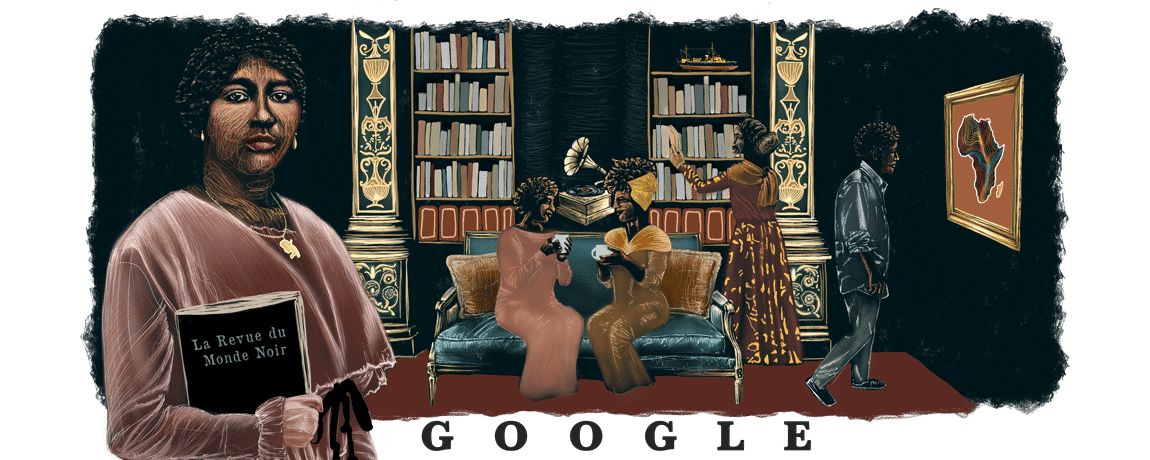Unveiling the Remarkable Legacy of Paulette Nardal: Afro-Feminism Icon

Image Courtesy: Google Doodle
Paulette Nardal (12 October 1896 – 16 February 1985) was a French writer from Martinique, a journalist, and one of the drivers of the development of black literary consciousness. She was one of the authors involved in the creation of the Négritude genre and introduced French intellectuals to the works of members of the Harlem Renaissance through her translations.
Life and Career
Born on October 12, 1896, in Martinique, she later moved to Paris, France, where she played a pivotal role in the Negritude literary and cultural movement. Félix Jeanne Paulette Nardal was the daughter of one of Martinique’s first Black engineers in the Department of Public Works. Nardal followed suit and established a trailblazing legacy of her own when she arrived in Paris in 1920 and became the first Black woman from Martinique to enroll at the city’s prestigious university, La Sorbonne, earning a master’s degree in English.
In the 1920s, members of the French Black community, many being West Indian immigrants like Nardal, often faced intense racial discrimination. Paulette Nardal and her sister Jane opened a Paris salon called Le Salon de Clamart in 1929 as an intellectual meeting ground to reflect on the Black condition. Known for its hospitality and elegance, the well-appointed salon allowed Nardal to gather intellectuals for conversation and mutual support. Scholars credit this salon as the birthplace of the Négritude movement, which Nardal helped initiate by authoring social commentary articles in the review journal “La Revue du monde noir” (“The Review of the Black World”).
Another significant moment of her life occurred at the beginning of World War II. Nardal left Martinique for France but suffered a lifelong injury when a submarine attacked her ship. Her demand for France to recognize her as a civilian war victim and survivor highlights the convergence of race, gender, disability, and citizenship. This event eventually inspired Nardal to establish organizations and newspapers encouraging educated women to channel their energies into social improvement and suffrage.
Nardal, along with her sisters, founded “La Revue du Monde Noir” (The Review of the Black World) in the 1920s, which served as a platform for Black writers and intellectuals to discuss issues related to race, identity, and colonialism. Her contributions to this publication helped promote the ideas that would later influence the Negritude movement.
Nardal’s career was not limited to the literary sphere. She was also involved in activism and women’s rights, advocating for the rights and recognition of Black women both in France and on the international stage. Her dedication to social justice and gender equality paved the way for future generations of Black women activists.
Tragically, Paulette Nardal passed away on February 16, 1985, but her legacy endures through her literary contributions, activism, and her role in fostering a sense of pride and identity among Black intellectuals. Her work continues to inspire and inform discussions on race, culture, and feminism, making her a remarkable figure in the history of the African diaspora and the struggle for equality and recognition.
Paulette Nardal Books
Some of her contemporaries made significant contributions to the world of literature and intellectual discourse through her writings and editorial work. She is primarily known for her involvement in “La Revue du Monde Noir” (The Review of the Black World), which she co-founded with her sisters in the 1920s. This publication served as a platform for Black writers and intellectuals to address various issues related to race, identity, colonialism, and the African diaspora. Nardal’s editorial work and contributions to the journal played a crucial role in promoting Black voices and ideas during that era.
Paulette Nardal’s work as an editor and her essays published in “La Revue du Monde Noir” remain significant and influential within the context of the Negritude movement and the broader discourse on Black identity and culture.
Award and Legacy
Nardal rose to prominence through her writings and fostered an international community of Black women who broke down barriers across race, class, and educational status. In recognition of her unifying work, Nardal was elected as a delegate to the United Nations in 1946 and was awarded the Knight of the Legion of Honour in 1976, the nation’s highest honor. There is the Promenade Jane-et-Paulette Nardal located on 100 rue Didot in Paris, and a plaque honors Nardal’s legacy in the Paris suburb of Clamart, where her salon catalyzed an international movement.
On 12 October 2021, Google celebrated Paulette Nardal’s 125th Birthday with a doodle.
Observer Voice is the one stop site for National, International news, Sports, Editor’s Choice, Art/culture contents, Quotes and much more. We also cover historical contents. Historical contents includes World History, Indian History, and what happened today. The website also covers Entertainment across the India and World.
Follow Us on Twitter, Instagram, Facebook, & LinkedIn

